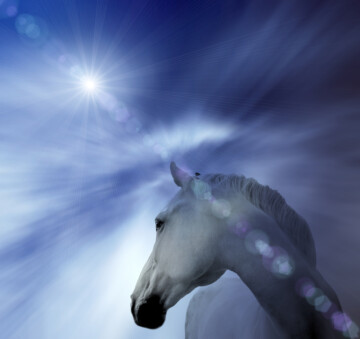
In this July 4th edition of her online newsletter, author Linda Kohanov shows how our current cultural and political struggles are nothing new in US history. Most importantly, she offers ideas for how to move out of this current stage of rebellious adolescence into a new era of growth, recovery and deep fulfillment. These timely insights draw from her books The Power of the Herd (2013) and The Five Roles of a Master Herder (2016), offering unique, and ultimately optimistic, perspectives into 250 years of predictable patterns, and most importantly, an unconventional path to the greener pastures of our true potential.
As the old saying goes, “Those who ignore history are doomed to repeat it.” That’s exactly what’s happening in U.S. politics right now. The high level of conflict we see on the news is not evidence of our country’s decline, however, but a symptom of its continued stagnation. In-fighting, back-biting politicians, frustrated citizens, callous opportunists, and media feeding frenzies that gleefully spread rumors, lies and propaganda, these features of modern democracy are actually as old as George Washington’s presidency. How do I know this? Why do I care? And perhaps more importantly, why should you care?
Remember Albert Einstein’s definition of insanity? “Doing the same thing over and over again and expecting different results.” Well, as it turns out, the U.S. has essentially been having the same intensely heated debate — using the same worn out, ineffective strategies — for well over two centuries. No wonder we all feel so crazy! The first step out of the asylum, however, involves actually recognizing that, at a multi-generational level, we’ve been doing all kinds of fruitless things over and over again, in the name of freedom, no less!

I was getting tired of hearing so many misconceptions about the history of democracy on talk radio and satellite TV. This puts me in a most unfamiliar position as I have never thought of myself as a history buff or a politically minded person. But literally and metaphorically I’ve been following horses around for the last 20 years, writing books and developing workshops on what these amazing animals have to teach people.
In 2009, I was surprised to discover how dramatically these powerful, nonpredatory creatures have influenced our most progressive human leaders over the last 3,000 years — and, in particular, at crucial turning points in our own country’s development. Quite unexpectedly, the horses trotted me down the winding road of U.S. history and dropped me off on George Washington’s doorstep for a good nine months of research. Then they herded me on over to Andrew Jackson’s era to watch the nineteenth century’s feistiest, backwoods leader fight a real, honest-to-goodness duel — over a horserace. That our seventh president won this deadly contest, against a much better marksman, not only reveals important features of Jackson’s character, the incident sheds considerable light on the admirable strengths and debilitating weaknesses of the modern American psyche.
As it turns out, these key moments in history provide significant perspective on our current social and political challenges. It is my hope that rather than being doomed to repeat history unconsciously, we can all become occasional history buffs to more fully understand where we’ve been, so that we, as concerned citizens and leaders of the future, can consciously alter our counterproductive behavior and move on to greener pastures.
Fierce Sensitivity
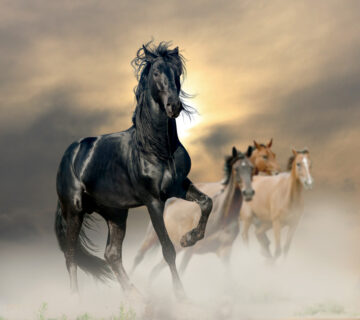
Significant social change cannot take hold, let alone endure, until large numbers of sensitive, caring people become empowered in more intelligent, mutually supportive ways. Now more than ever, we need thoughtful, compassionate individuals to enter situations where suffering and conflict proliferate, and model a different form of strength, one that protects the vulnerable and holds people accountable without becoming contentious or abusive. Otherwise, we will continue to see frustrated, disillusioned people acting out, bullies stirring up fear to gain control, and sociopaths callously thriving at others’ expense in business as well as politics.
Power and empathy are not mutually exclusive. Cultivating a balance between the two is essential for every responsible adult to achieve if we are finally to fulfill the promise of what our founders were ready to die for 1776.
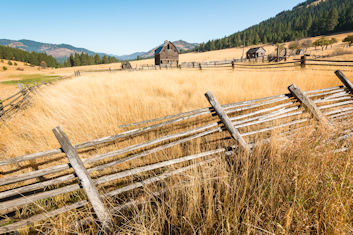
Modern civilization is still based on a hierarchical, command-control model of leadership that is fast becoming problematic, simply because people are more empowered, better educated, more informed, and more mobile. Through five thousand years of conquest, slavery—and, in our time, the efforts of a privileged few to control large populations for profit and convenience—we’ve limited our own development of optimal social behavior. During the U.S. Revolutionary War, our forefathers successfully fought for freedom, but we still don’t have the skills to use it effectively. Events of the past two-hundred-and-fifty years prove that once the old fences fall down and the herd breaks free, command-control approaches become impotent or abusive. The fact that we keep using these outmoded tools, despite their compromised effectiveness, underlines our current state of arrested development. We are free, and yet we are continually sliding back into old habits, struggling to find a way out of chaos into connection.
Like those feral horses we call mustangs, the descendants of human “refugees” from all walks of life — escaped slaves, liberated women, religious and political dissidents, disenfranchised youth, anarchists, peace activists, disgruntled corporate employees — can’t help but gather in groups, kicking, rearing, biting, and striving to reclaim their dignity in the outback of human experience. Until somehow, hopefully, people learn new ways to get along, to graze peacefully, protect each other, raise families, brave the elements, and endure the droughts, while seeking those mythical greener pastures. The problem is that even the most sincere, potentially innovative groups have trouble collaborating, using their power effectively, and, most importantly, airing differences constructively and respectfully. And so the same cycle of rebellion, conviction, optimism, conflict, blame, hostility, disempowerment, and disillusionment starts up again in whatever “new world” the next round of rogues and visionaries hopes to mold into the perfect “earthly paradise.” We see this cycle currently wreaking havoc in our social and political systems every time we turn on the news.
Learning to share power is the challenge of the 21st century. But we don’t have to reinvent the wheel, as it turns out. If we adopt the social intelligence and leadership skills pioneered by our nomadic cousins who still live in horse-based pastoral cultures, while valuing the technological innovations that could only have been perfected in a sedentary, city-based context, we will combine the best of both worlds.
Stone Age Power Tools
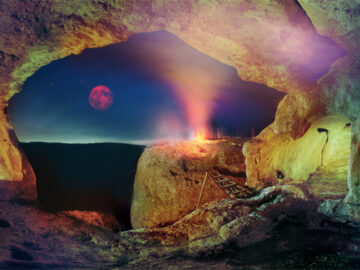
The horse perspective allowed me to look at human behavior from a unique perspective. I realized that many of the challenges we currently face cannot be solved by debating and defending surface ideology. Over time, I was able to isolate four highly unproductive habits humans engage, regardless of their religious, cultural, philosophical, or political background, which I call the Stone Age Power Tools (in the The Power of the Herd). I argue that if we refrain from using these antiquated yet still prevalent ways of dealing with stress and trying to influence others—replacing these habits with twelve Guiding Principles that offer a nonpredatory approach to interpersonal challenges, personal empowerment, and creativity—our world cannot help but change for the better.
But what happens after we remove fear, shame, blame, objectification, projection, revenge, and predatory dominance from the equation? What does power look like when the shackles are removed?
Here’s where an all too often ignored dimension of history foreshadows an unexpected answer: Among Alexander the Great, the Buddha, Genghis Khan, Joan of Arc, George Washington, Katherine the Great, Geronimo, Winston Churchill, and many other influential leaders, a pattern emerges. For thousands of years, the invisible forces of charisma, bravery, poise, focus, endurance, and conviction have been most reliably bolstered by a silent, nonpredatory tutor. Recognizing the horse’s multicultural importance, not just as a beast of burden, or even a companion of kings, but as a teacher of kings, conquerors, heroes, and pioneers, is an essential first step in wresting this wisdom from obscurity and purposefully exercising it in the future.
New Moon Rising

The horse stands at the place where all trails come together, and a new moon shines upon us. To retrace the steps of sorrow and injustice, courage, compassion, and innovation — elevated by a being that has been used for both conquest and freedom — is to know the dark and light of power.
The training my horses provided encouraged me to gaze ever more deeply into the limitations of my own socially conditioned mind, allowing me to glimpse “civilized” human behavior through a wider lens. Staring at historical and current events from this new perspective, I realized that whether I was a left-wing democrat, a right-wing republican, a fundamentalist Christian, a radical feminist, a gay rights advocate, a communist, fascist, creationist or scientist, my effectiveness in the world was likely to be impaired by the exact same unconscious habits. Our ancestors had sailed across a potentially hostile ocean to escape the ravages of persecution and tyranny, hoping for a fresh start in the land of the free and the home of the brave, only to build wildly hopeful structures of democracy on the same faulty foundation of long-buried, largely nonverbal assumptions and behaviors. For this reason, I doubted technology would save us; neither would liberal and conservative agendas based on the same worn-out neural pathways meandering through our fearful, body-phobic, increasingly dissociative, egotistical, machine-worshipping heads.
These unproductive power strategies are universal, existing below the surface of ideology. And yet they’re sometimes reinforced in the name of tribal tradition, religion, and/or social pressure. In reality, major world religions explicitly discourage most of these behaviors, but they are incredibly insidious. Over the last three thousand years or so, religious, cultural, moral, and even legal efforts to curtail some of these harmful habits have been marginally successful as people continue to cling to what they know. I’ve grappled with them myself. I’ve seen devout Christians, Jews, Buddhists, Muslims, Native Americans, atheists, politicians, scientists, educators, entrepreneurs, horse trainers, new age idealists, open-hearted social activists, and predatory sociopaths all use them over the years, with predictably damaging results, providing short-term solutions that stir up more trouble in the long run, often causing significant suffering that subsequent generations are forced to mop up.
Silent Heroes
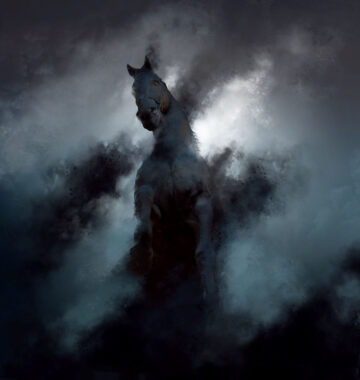
How often do we read about the mythic or historical adventures of heroes, barely noticing the silent heroes they ride? What is a hero, after all? Someone who transcends survival instincts to face the unknown, sometimes enduring terrifying ordeals for a greater cause? Someone who remains poised in the midst of turmoil, who prevails despite the odds to capture a treasure from the gods, an uplifting innovation, enduring significant hardships to bring some glistening piece of magic back to the tribe?
By this definition, horses are every bit as heroic as their riders, perhaps even more so: a prey animal going to war is the epitome of a counterintuitive, wholly unnatural move. And yet, horses re-connect us to nature, more specifically to nature’s gifts, her ability to not just challenge, but nourish, inspire, and renew us.
And so, after the long journey we’ve taken together, we come to the deepest, most healing piece of horse wisdom I can offer: The importance of joy, awe, wonder, and inspiration, of celebrating the talents and intelligence of other beings, appreciating daily acts of kindness and courage, as well as the beauty of this world we all share, most especially those rural areas and wilderness preserves we must guard as blessings from a benevolent force still urging us to grow out of fitful adolescence into real maturity, empowered empathy, agile understanding, and unbridled yet compassionate creativity.
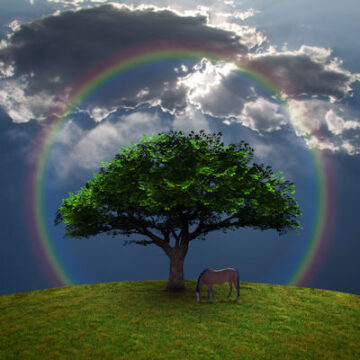
Horse wisdom, fully activated in humans, requires paying attention to what is good and right with the world, and expanding that, even as we protect ourselves from predators hiding in the grass. No matter what’s happening around us, the emotional agility, social intelligence, and fear management skills horses teach help us deal efficiently with technical difficulties and interpersonal challenges—and then “go back to grazing.” Over time, as we learn to ride life’s roller coaster with ease, an underlying sense of “deep peace” emerges and strengthens. We find that we can let go of the stories that tie us to past injustice. And we can fully enjoy the present, knowing that we are courageous, empowered, and adaptable enough to meet the future with the relaxed yet expanded awareness of a mature herd leader.
Now that horses are no longer obliged to work in our fields and carry us to war, they’re doing something more important: They’re working on us, helping us reclaim, daily, a hint of paradise not so much lost as misplaced. In rekindling our relationship with horses as guides—as catalysts of human transformation going back at least 30,000 years—we can’t help but realize that even when we wander off the main trail and get lost in the woods, we are never alone in this world.
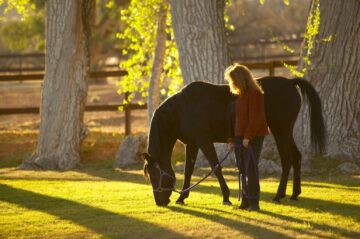
Linda Kohanov is one of the founders of equine-facilitated learning, a modality that teaches advanced human development skills through non-riding activities with horses. Her in-person workshops, books and online courses distill the wisdom people learn from working with horses into tools and principles that directly translate to the human world.
Descriptions of her fall 2023 workshops, as well links to specially trained instructors around the world, are available at www.eponaquest.com or www.masterherder.com. Her new self-paced online courses are offered at https://lindakohanov.com Just scroll down the home page to see how you can learn unique skills for success in life, work and relationships in the comfort of your own home. These tools and principles are also useful with horses and other animals, including those that have been mistreated.
To receive 15% off any or all Linda’s online courses, use the code “15success” when you